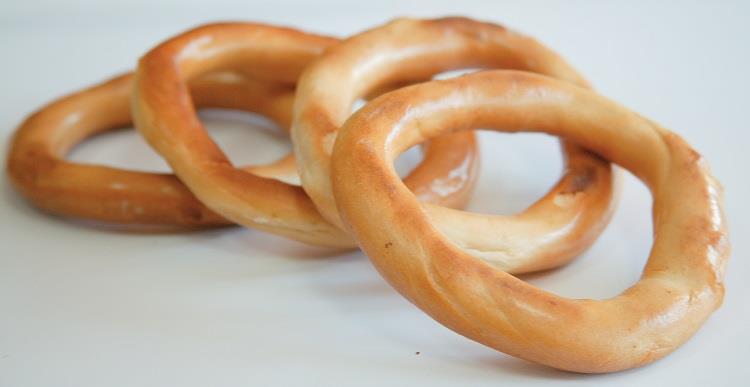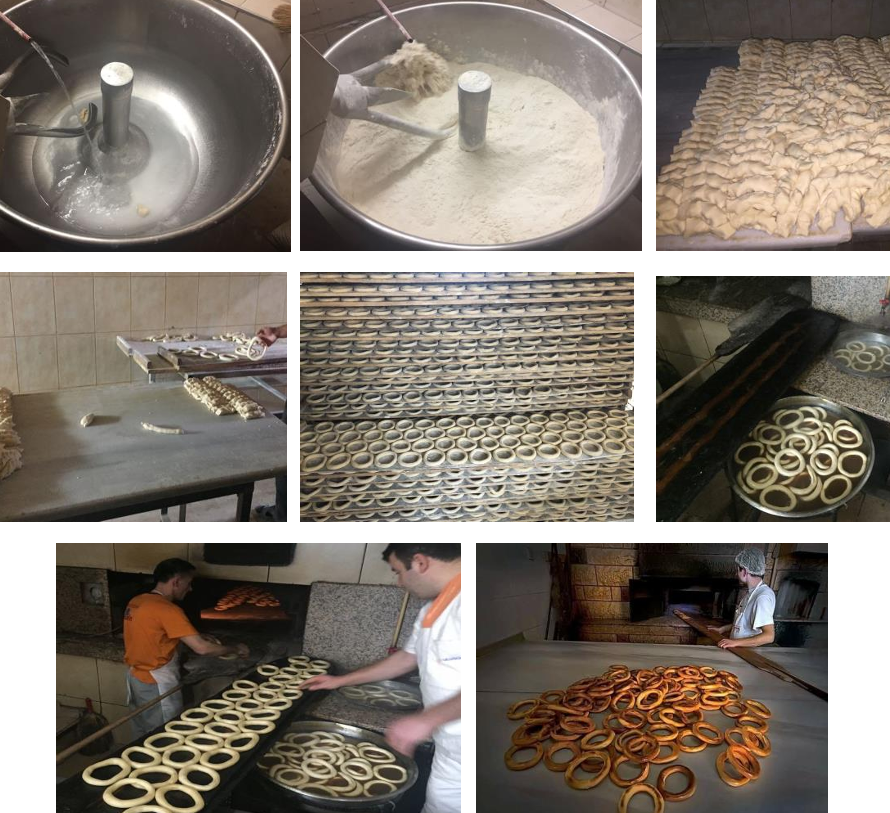Rize Simidi is a type of sesame-free simit specific to the province of Rize, located in Türkiye's Black Sea Region, and is categorized as a bakery and pastry product. This product, registered as a designation of origin, was registered as a geographical indication on January 24, 2019, with number 410, and its registration application was filed on November 15, 2017, with application number C2017/196. The registration holder is Rize Municipality.

Rize Simidi (T.R. Ministry of Culture and Tourism)
Distinguishing Characteristics
Rize simidi is a pastry prepared with flour, fresh yeast, salt, water, and molasses made from scented black grapes (Vitis Labrusca L.) grown in the Rize region, and cooked by boiling. The history of the product dates back to the 1930s according to written sources. In the Rize Local Newspaper dated August 5, 1939, a council decision taken by Rize Municipality included regulations such as the weight and price of the simit. In interviews conducted with individuals aged 63-91 in Rize, these individuals stated that they had been consuming the simit since their childhood.
Unlike simits produced in other provinces, Rize Simidi stands out with the following distinguishing features:
- The product is sesame-free.
- It is dipped in local grape molasses before baking.
- A boiling process is applied.
- Scented grape molasses ensures the product bakes homogeneously.
- The simits are rested on wooden boards called "pasa," made from pine or chestnut wood.
Furthermore, due to the humid climate in Rize, there are differences in fermentation and baking times for pastries. Rize simit masters are known for their ability to maintain product quality under these conditions. In Rize, simits from each simit bakery are offered for sale tied with different colored strings in groups of 25 or 50.
Chemical and Microbiological Properties
Chemical Properties
- Moisture: Maximum 26%
- Salt (in dry matter): Maximum 2%
- Acid content: 6 ml with 0.1 N NaOH to neutralize 100 g of product
Microbiological Properties
- Total mesophilic aerobic bacteria: Maximum 10⁶ cfu/g
- Rope spore count: Maximum 10² cfu/g
- Mold: Maximum 10² cfu/g
- Escherichia coli, Salmonella, Staphylococcus aureus: Must not be present
Properties of Grape Molasses
The molasses used in Rize simidi is made from the Isabella grape variety, known as "scented grape," grown in the region. Its physical and chemical limits are as follows:
- Total ash: Maximum 2.5%
- Water-soluble dry matter (Brix): Minimum 68%
- HMF (Hydroxymethylfurfural): Maximum 75 mg/kg
- pH: Must be outside the 3.5–5.0 range
- Sucrose and raffinose: Maximum 1.0% each
- Maltose: Maximum 0.2%
- Fructose/Glucose ratio: 0.9–1.1
- δC13 value: More negative than -23.5‰
- Tartaric acid/malic acid ratio: ≥ 1
Production Method
The following raw materials are used in the production of Rize simidi:
- 50 kg flour
- 20 g fresh yeast
- 900 g salt
- Water
- Grape molasses (from Isabella grapes)
The production process consists of the following stages in summary:
- Dough is prepared using flour, fresh yeast, water, salt, and drinking water compliant with TS 266.
- The dough is rested for 1–2 hours.
- 65 g pieces are hand-rolled into a simit shape.
- The simits are rested for 10 minutes on wooden boards called "pasa."
- They are boiled in hot water for 1–2 minutes.
- They are dipped in a cold grape molasses-water mixture and rested for 5 minutes.
- After the molasses on them dries, they are baked for 7–10 minutes at a temperature of 270–300 °C in ovens made of black stone, measuring 2.20 x 2.20 m.
- Cooked simits must weigh at least 50 g. Products below this weight cannot be sold under the name "Rize Simidi."
Simits are traditionally released to the market in bundles of 25 or 50. Each producer bakery is recognized by its own tying string color.

Rize Simidi Production Stages (Turkish Patent)
Geographical Boundary and Production Conditions
The production of Rize simidi can only be carried out within the provincial borders of Rize. It is mandatory for the product to be prepared using traditional methods and specifically with molasses made from grapes grown in the region. The humid climate conditions specific to Rize and the local expertise in production are among the key factors determining the product's characteristic features.
Inspection
Inspections regarding the production and marketing process of the product are carried out under the Industrial Property Law No. 6769. Representatives of the following institutions are included in the inspection authority:
- Rize Municipality (coordinator)
- Rize Provincial Directorate of Agriculture and Forestry
- Rize Chamber of Commerce and Industry
- Rize Commodity Exchange
- Rize Union of Chambers of Tradesmen and Craftsmen
- Bakers' Chamber
Inspections are carried out regularly at least three times a year. In case of a complaint, additional inspections are conducted. Inspection results are reported annually by Rize Municipality to the Turkish Patent and Trademark Office. If necessary, support can be obtained from public or private institutions or expert individuals.


